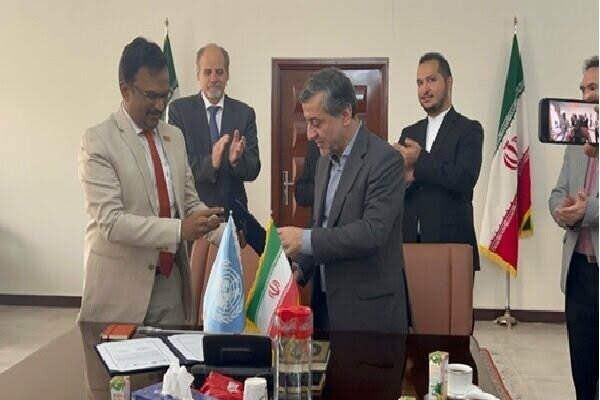Iran, UN to train Afghan women as midwives and nurses

TEHRAN- Iran and the United Nations signed a memorandum of understanding in Tehran on Wednesday to provide nursing and midwifery skill-based education to Afghan women residing in Iran.
Abolfazl Bagherifard, Iran’s deputy health minister for education, and Stefan Priesner, the United Nations Resident Coordinator for Iran, signed the MOU, Mehr reported.
Hassan Kazemi Qomi, Iran’s special envoy for Afghanistan who simultaneously acts as Tehran’s ambassador to Kabul, was also present in the signing ceremony.
Priesner said that this was an important step forward in fostering inclusiveness and empowering those who have been forced to leave their homes in Afghanistan, a report released by the UN said.
The initiative will be led by UNFPA in cooperation with the World Health Organization, the UN refugee agency, and the International Organization for Migration to support Iran’s efforts to address the needs of Afghan refugees.
The Ministry of Health will run the courses for 100 midwifery and nursing female Afghan students.
Bagherifard, for his part, said that the course will last four months for students to acquire the necessary abilities and skills.
“They will be able to provide desirable and quality services in the field of healthcare in Afghanistan.”
According to the UN refugee agency, with over 3.4 million refugees and displaced persons, Iran has become the second largest refugee-hosting country globally after Turkey. Iran is currently hosting over 1.1 million Afghan refugees.
More than 40,000 Afghan students are currently studying in Iranian universities, Vahid Haddadi-Asl, the Iranian deputy science minister for international affairs, said in May.
There are no limitations for admitting Afghan students in Iran, ISNA quoted Haddadi-Asl as saying.
In June 2022, Maha Kashour, head of the Office of the UN High Commissioner for Refugees in Mashhad, said Iran’s efforts and activities in the last 40 years have been commendable to refugees, and in the past year, after the Taliban takeover in Afghanistan, has reached its peak.
Iran has so far been able to provide decent services to refugees in the fields of health, livelihood, and vocational training in cooperation with UNHCR, she noted.
Mine risk education
On August 15, the Iranian Red Crescent Society provided more than 115,000 Afghan refugees with Mine risk education.
Mine risk education is a preventive health and education initiative that seeks to save the lives and limbs of civilian adults and children who are either living with the threat of landmines or who are likely to face such a threat (for example, during and following the repatriation or return of displaced persons).
Its primary strategy is to instill safe behavior by raising awareness and educating both those at risk as well as those around them who can influence their behavior.
Over the first four months of the current Iranian calendar year (March 21-Juy 22), mine risk education was provided to 115,692 Afghan refugees while they were leaving Iran via the Dogharon border, Mehr reported.
During the same period of last year, 126,179 Afghan nationals who were planning to return to their country, received mine risk education.
Teacher Training program
Since launching in 2021, the UNESCO Afghan Teacher Training Program has made significant progress in fostering a brighter future for displaced Afghan teachers and students.
Supported by the Government of Japan and UNICEF Iran, and in collaboration with the Iranian National Commission for UNESCO and the Universities of Tehran, and Kharazmi, this initiative is equipping Afghan refugee teachers in the Islamic Republic of Iran with the necessary tools and skills to provide quality education amidst challenging circumstances.
With the completion of its first phase in 2022, and upcoming phases in 2023, the program has enabled approximately 500 Afghan women refugee teachers in Iran to receive recognized training and certification.
The teachers are also trained to provide psychosocial support to these out-of-school and crisis-affected children, helping them to overcome the challenges of displacement and adapting to a new environment.
Recognizing that teachers are not mere conveyors of knowledge but also role models, the program strives to also provide them with the required training to inspire and empower their students.
The quality education and support provided by these trained teachers will indirectly benefit approximately 9,000 primary school students in Iran.
MT/MG
